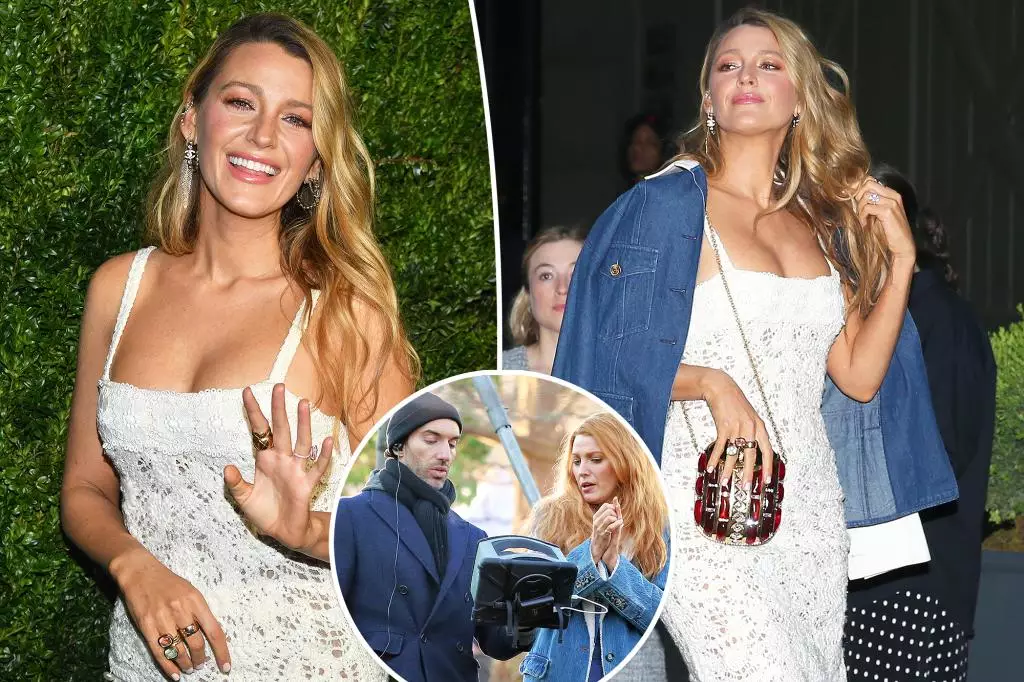Blake Lively graced the Chanel Tribeca Festival Artists Dinner with an unmistakable air of triumph, appearing vibrant and cheerful amidst the backdrop of a pivotal moment in her life. The actress, best known for her role in “Gossip Girl,” delighted attendees as she walked the red carpet in a striking white crochet dress, exuding elegance and confidence. Adding a twist of vintage flair, she donned a denim jacket that draped effortlessly over her shoulders, reflecting both style and a sense of rebellion. This striking ensemble was completed with eye-catching accessories, including Christian Louboutin pumps and a distinctive Chanel scarab purse, signaling her adeptness in fashion while hinting at the multifaceted layers of her current situation.
The joyful aura of the evening was magnified by the recent legal victory she secured against Justin Baldoni—a battle that had absorbed much of her attention following her initial sexual harassment complaint against him. The dismissal of Baldoni’s staggering $400 million lawsuit was not merely a procedural victory; it represented a landmark moment in Lively’s fight for integrity and respect in a landscape often dotted with precarious power dynamics. Judge Lewis J. Liman’s ruling, which dismissed Baldoni’s claims alongside his libel lawsuit against the New York Times, echoed a sentiment of judicial discernment, emphasizing the protections offered to those who come forward with accusations of misconduct.
The Implications of Legal Victory
Lively’s experience reveals an unsettling reality: navigating the tumultuous waters of industry relationships can often lead to retaliatory measures that silence rather than support accusers. The judge’s dismissal articulated that Baldoni’s accusations lacked the substantiation necessary to warrant defamation claims, reinforcing the notion that brave individuals like Lively should not be stymied by the fear of litigation when exercising their right to speak out. This ruling not only solidifies Lively’s standing but also sends a broader message regarding the importance of voice and validation in the entertainment industry.
Lively’s legal team was quick to express their intent to pursue not just attorneys’ fees but also treble and punitive damages against Baldoni, framing their action as a form of accountability for what they term “abusive litigation.” This move indicates a commitment to not only dismantling the narrative propagated against Lively but also emphasizing the consequences faced by those who initiate unwarranted legal assaults. It’s a bold statement that resonates deeply with advocates for women’s rights and resonates with many who are familiar with the nuances of power abuse.
A Personal Declaration of Resilience
In her Instagram Story, Lively further articulated her stance, making it clear that her resolve has only strengthened in light of recent events. “I’m more resolved than ever to continue to stand for every woman’s right to have a voice in protecting themselves,” she declared, showcasing the depth of her commitment to not just her personal journey but also to the collective narrative of women in vulnerable positions. Her words resonated with the frustrations and struggles experienced by countless individuals who face similar dilemmas, highlighting the essential right to defend one’s integrity, safety, and story.
Moreover, Lively’s open acknowledgment of the emotional toll that a retaliatory lawsuit can take—a “manufactured shame” designed to break spirits—underscores a significant aspect of her narrative: the psychological burden that often accompanies allegations of misconduct. By sharing her experience, Lively creates a platform for dialogue, encouraging others to recognize not just the need for justice, but also the protective mechanisms that must exist to support victims in the aftermath of abuse.
Looking Ahead: A Narrative of Change
As the dust settles on this legal battle, it raises critical questions about the environment within which female actresses operate. The entertainment industry must reckon with its tendencies towards safeguarding power dynamics that disproportionately disadvantage women. Lively’s victory could mark a turning point, not just for her, but for those who might feel disempowered to share their truths for fear of retribution.
The challenge remains: will these victories transform into systemic change that ensures all voices, especially those of women facing threats of silencing, are empowered and supported? As Lively steps into the next chapter of her career and life, her experience serves as a catalyst for a broader movement toward respect, protection, and the fierce reclamation of agency in an industry often prone to exploitation and conflict.


Leave a Reply